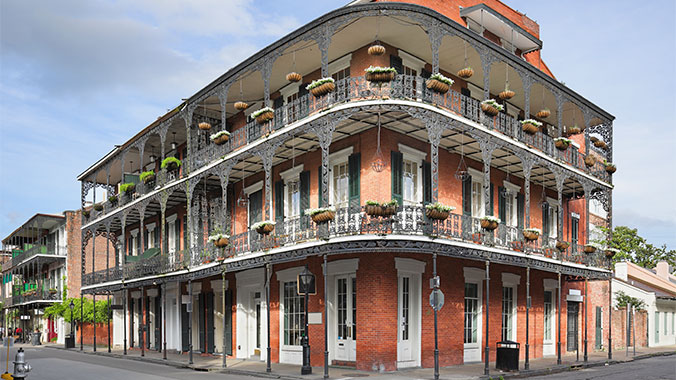Tennessee/Louisiana
Music Cities USA: Nashville, Memphis, New Orleans
Program No. 21979RJ
From the historic Grand Ole Opry in Nashville to legendary Beale Street in Memphis and the iconic jazz of New Orleans, join us for a learning adventure that will be music to your ears.
Enroll with Confidence
We want your Road Scholar learning adventure to be something to look forward to—not worry about. Learn more
Protecting the Environment
We offset a portion of the emissions created by your travel. Learn more
Itinerary
While we make every effort to ensure the accuracy of our published materials, programs are typically advertised more than a year prior to their start date.
Read More.
While we make every effort to ensure the accuracy of our published materials, programs are typically advertised more than a year prior to their start date. As a result, some program activities, schedules, accommodations, personnel, and other logistics occasionally change due to local conditions or circumstances. Should a major change occur, we will make every effort to alert you. For less significant changes, we will update you during orientation. Thank you for your understanding.
Duration
10 days
9 nights
What's Included
19 meals (
8B, 1BR, 4L, 6D
)
5 expert-led lectures
14 expert-led field trips
4 performances
An experienced Group Leader
9 nights of accommodations
Taxes and customary gratuity
Road Scholar Assurance Plan
Day
1
Check-in, Registration, Orientation, Welcome Dinner
Location:
Nashville, TN
Meals:
D
Stay:
Hyatt Place Nashville Downtown
Activity Note
Hotel check-in from 3:00 p.m.
Afternoon:
Program Registration: 3:00-5:00 p.m. After you check in and have your room assignment, join us at the Road Scholar table to register with the program staff, get any updated information, and confirm the time and location of the Orientation session. If you arrive late, please locate your Group Leader and let them know you have arrived. Orientation: 5:00 p.m. The Group Leader will greet everyone and lead introductions. We will review the up-to-date program schedule, discuss roles and responsibilities, logistics, safety guidelines, emergency procedures, and answer questions. We will be accompanied on some field trips by local experts who will provide commentary as we go. At some field trip sites, the extent and duration of walking and other activities will be according to personal choice. Travel and transfers will be via private motorcoach unless noted otherwise. Periods in the daily schedule designated as “Free time” and “At leisure” offer opportunities to do what you like and make your experience even more meaningful and memorable according to your personal preferences. The Group Leader will be happy to offer suggestions. Program activities, schedules, personnel, and indicated distances or times may change due to local circumstances/conditions. In the event of changes, we will alert you as quickly as possible. Thank you for your understanding.
Dinner:
At the hotel.
Evening:
At leisure. Continue getting to know your fellow Road Scholars, settle in, and get a good night’s rest for the day ahead.
Day
2
Studio B, Nashville Field Trip, CMHF, Grand Ole Opry Show
Location:
Nashville, TN
Meals:
B,D
Stay:
Hyatt Place Nashville Downtown
Activity Note
Getting on/off a motorcoach; driving about 60 miles, approximately 3 hours riding time. Walking up to 2 miles throughout the day; city streets and sidewalks. Country Music Hall of Fame Museum 1 block walk from hotel.
Breakfast:
At the hotel.
Morning:
We will board a motorcoach with a local expert for a field trip to Studio B, originally RCA Studios, home of thousands of hits that helped to define the “Nashville sound.” Chet Atkins was one of the originators and Elvis mastered more than 200 songs here. Our expert will tell us about many of the quirks and idiosyncrasies of this unique space where so much musical history has been created using the pianos, mics, and accessories we will see. We’ll also have an opportunity to sit back and listen to recordings by our favorite artists in Studio B. We will then set out on a Nashville city field trip by motorcoach. Our expert has a wealth of knowledge and passion for Nashville music and who will provide commentary as we ride. Music has always been the common thread connecting the life and soul of Nashville and its people. The first permanent settlement began on Christmas Day 1779, celebrated with fiddle tunes and buck dancing. Davy Crockett, Nashville’s first celebrity, was known far and wide for his colorful stories and fiddle playing. Nashville became a national center for music publishing. The first around-the-world tour by a musical group was the Fisk Jubilee Singers from Nashville’s Fisk University. Their efforts helped fund the school’s mission of educating freed slaves after the Civil War and put Nashville on the map as a global music center. Here in the heart of Nashville’s entertainment industry, we will see the offices of record labels, publishing houses, music licensing firms, recording studios, video production houses, and other businesses that serve the music industry, as well as radio networks and radio stations. We’ll return to the hotel after our field trip.
Lunch:
This meal has been excluded from the program cost and is on your own to have what you like. The Group Leader will be happy to offer suggestions. You might like to pick up a sandwich at The Country Music Hall of Fame or walk a block over to Broadway Street, an area with numerous restaurants.
Afternoon:
For our next field trip, we will walk to the Country Music Hall of Fame. We will have tickets provided for our self-directed exploration. To be invited to be a member of the elite group at the Country Music Hall of Fame is one of the highest honors in country music. The award recognizes persons who have made outstanding contributions to country music over the length of their careers. The museum’s vast collection includes memorabilia illustrating the evolution of country music through the two centuries. We will be able to get a clear sense of that history through its treasure trove of historic video clips, recorded music, dynamic exhibits, and state-of-the-art design. For information on current special exhibits, visit www.countrymusichalloffame.org
Dinner:
We will board the motor coach at 4:00 pm for dinner at a restaurant across the street from the Grand Ole Opry.
Evening:
After dinner, we will walk across the street to the Grand Ole Opry. The Grand Ole Opry celebrates country music’s diversity, presenting the many generations of artists who have formed country music’s legacy and continue to forge its future course. Audiences can expect the best in country, bluegrass, comedy, gospel and more by Country Music Hall of Famers, cast members who helped establish the Opry as the home of country music, revered superstars, and young artists just starting to make names for themselves. Our program was planned far in advance when details of performances were not available. When confirmed, the information will be posted on the Road Scholar website under this program number and will also be included in preparatory materials sent following enrollment. You can also go to www.opry.com about two weeks before the date to see who is scheduled.
Day
3
Ryman Auditorium, Opry House Behind The Scenes
Location:
Nashville, TN
Meals:
B
Stay:
Hyatt Place Nashville Downtown
Activity Note
Getting on/off a motorcoach; driving about 20 miles throughout the day, approximately 1 hour riding time. Walking up to 1/2 mile throughout the day; standing approximately 1 hour each at Ryman Auditorium and Grand Ole Opry House.
Breakfast:
At the hotel.
Morning:
We will walk as a group to the Ryman Auditorium for an expert-led field trip. We will see dressing rooms dedicated to the stars of the Ryman’s rich musical past, such as Minnie Pearl, Johnny Cash, and Hank Williams. (Note: We will not be able to go through the dressing rooms if a performance is taking place that day.) We’ll stand in the wings where performers as varied as Katharine Hepburn, Elvis Presley, and James Brown awaited their time in the spotlight. This National Historic Landmark is most famous as the home of the Grand Ole Opry from 1943-1974. Its history as Nashville’s premiere theater began with its original incarnation as an evangelical tabernacle in 1892. Dubbed the Carnegie Hall of the South, it went on to become the place for important community events, political rallies, as well as operas, symphonies, bands, ballets, and theatrical productions. The incredibly popular Grand Ole Opry radio show found a home here in 1943, and Ryman Auditorium was inseparably linked to the origins and rise of the modern-day genre of country music. Although the Opry moved to a new location in 1974, the Ryman has remained as a major attraction, undergoing a multi-million dollar restoration that brought back its original splendor, hosting top performers from around the world who praise its fine acoustics.
Lunch:
On your own to have what you like in historic downtown Nashville. The Group Leader will be happy to offer suggestions.
Afternoon:
We will regroup at the hotel, board the motorcoach, and ride to the Grand Ole Opry House. We’ll learn the fascinating story of the Opry from a local expert who will share stories about its history and country music greats past and present. We’ll go onstage for a first-hand look at the tiered auditorium as seen from the performers’ perspective, then go backstage for a rare glimpse of what happens behind the scenes, including the artists’ entrance. We’ll also have some independent time to stroll through the halls filled with Opry memorabilia before returning to the hotel.
Dinner:
Dinner is on your own tonight.
Evening:
The evening is at leisure. Prepare for check-out and transfer in the morning.
Day
4
Belle Meade, Transfer To Memphis, B. B. King’s Blues Club
Location:
Memphis, TN
Meals:
B,L,D
Stay:
Hampton Inn & Suites Memphis - Beale Street
Activity Note
Getting on/off a motorcoach; driving about 200 miles throughout the day, approximately 4 hours riding time. Walking equivalent of a city block at Belle Meade; uneven terrain. At BB King’s, dinner on second floor; no elevator.
Breakfast:
At the hotel.
Morning:
We will check out of the hotel, load our luggage onto the motorcoach, and begin our transfer to Memphis, Along the way, we will stop for a field trip at a living vestige of a bygone era: Belle Meade historic home and winery. Led by an expert, we will learn how the original Harding family farm began in the early 1800s and developed over the next several decades. The mansion we see today, built in Greek Revival style, was commissioned in 1845 and tells the century-long history of Belle Meade. Through the stories and experiences of the Harding and Jackson families, we'll learn about the women, men, and children who labored here.
Lunch:
At Belle Meade in the 1800s Carriage House/Stable House.
Afternoon:
We will resume our ride to Memphis and watch a specially selected movie on the way. Upon arrival, we’ll check in to our hotel with some time to freshen up and relax before dinner.
Dinner:
We will walk to world-renowned BB King’s Blues Club and Restaurant on Beale Street. Stairs to dinner on second floor; no elevator.
Evening:
The house band is BB King’s All Stars. Guest musicians include some of the best in the business for one of the most diverse, sophisticated lineups of modern blues and R&B in Memphis. Sit back and tap your toes or get up and dance. Stay on or go out and hear all the music you like up and down Beale Street. Note: Midnight is the cut-off time for loud music in Memphis. Our hotel is right at Beale Street, so be prepared.
Day
5
Graceland, Sun Studio, Rock ‘n’ Soul Museum
Location:
Memphis, TN
Meals:
B,L
Stay:
Hampton Inn & Suites Memphis - Beale Street
Activity Note
Getting on/off a motorcoach; driving about 45 miles throughout the day, approximately 1 hour riding time. Walking at field trip sites; uneven terrain at Graceland, up/down stairs, no elevator. Climbing stairs at Sun Studio Museum; no elevator.
Breakfast:
At the hotel.
Morning:
We will board the motorcoach for a field trip to the 14-acre Graceland estate that was the home of Elvis Presley. It is now a virtual shrine with museums, films, and exhibits for a unique glimpse into the life and times of The King. We’ll have a self-directed exploration with audio guides to see personal mementos including gold and platinum awards.
Lunch:
At a Graceland restaurant.
Afternoon:
We will continue our exploration with a field trip to Sun Studio, an iconic recording studio where some of the most famous artists recorded in the 1950s. Whether rock-and-roll or country, and genres in between, the likes of Johnny Cash, Elvis Presley, Carl Perkins, Roy Orbison, Charlie Feathers, Ray Harris, Warren Smith, Charlie Rich, and Jerry Lee Lewis could be found there at one point or another. Led by a Sun Studio expert, we’ll see where they made musical history. We will finish our day with a field trip to the Memphis Rock ‘n’ Soul Museum, the first museum ever jointly developed by the Smithsonian Institution and the National Museum of American History. Opened in August 2004, it came out of a traveling exhibition on the roots of uniquely American music in the South, from “field hollers” to work songs, blues, country, and gospel. These more countrified forms gradually met and mingled with their urban cousins: blues, jazz, and what became rock ‘n’ roll, rockabilly, rhythm and blues, and soul music. It charts the story of a field of music that has had a tremendous impact on popular culture and lifestyles from the mid-20th Century through today. It also documents the story of musical pioneers who overcame racial and socio-economic barriers to create music that changed our world. The museum’s digital audio guide lets us move at our own pace on a self-directed visit through seven galleries of audio-visual programs, instruments, costumes, other musical treasures, and more than 300 minutes of information including more than 100 songs.
Dinner:
On your own to have what you like.
Evening:
At leisure. See more of Memphis on your own, spend time with newfound Road Scholar friends, or just relax.
Day
6
Memphis City Field Trip, Civil Rights Museum, Stax Museum
Location:
Memphis, TN
Meals:
B,D
Stay:
Hampton Inn & Suites Memphis - Beale Street
Activity Note
Getting on/off a motorcoach; driving about 15 miles, approximately 1 hour riding time. Walking at field trip sites.
Breakfast:
At the hotel.
Morning:
We will board the motor coach with an expert who has a passion for Memphis, its music, and sites. Next, we will board the motorcoach for the short drive to the National Civil Rights Museum, a privately-owned complex of museums and historic buildings built around the former Lorraine Motel where Dr. Martin Luther King, Jr. was assassinated on April 4, 1968. We’ll follow a timeline that charts the course of events around the assassination and the impact and legacy of the civil rights movement.
Lunch:
On your own to enjoy what you like in downtown Memphis. The Group Leader will be happy to offer suggestions.
Afternoon:
After lunch we will regroup at the hotel and take the motor coach to Stax Museum, one of only a handful of museums in the world dedicated to soul music.
Dinner:
At one of Memphis’s most popular restaurants.
Evening:
At leisure. Prepare for check-out and transfer in the morning.
Day
7
Transfer to New Orleans, Welcome to NOLA Dinner, Jazz Sounds
Location:
New Orleans, LA
Meals:
B,L,D
Stay:
Hotel Monteleone
Activity Note
Getting on/off a motorcoach; driving about 400 miles, approximately 5.5 hours riding time (depending on traffic and local circumstances).
Breakfast:
At the hotel.
Morning:
After checking out of the hotel, we will board the motorcoach for our ride to New Orleans with expert commentary en route.
Lunch:
At a characteristic local restaurant en route.
Afternoon:
Our transfer will continue. After arrival and check-in at the hotel, we will have some time to freshen up and relax before dinner.
Dinner:
At the hotel.
Evening:
At leisure. Music abounds right inside the hotel at Irwin Mayfield’s Jazz Playhouse.
Day
8
History & Culture, French Quarter Walk, City Field Trip
Location:
New Orleans, LA
Meals:
B
Stay:
Hotel Monteleone
Activity Note
Getting on/off a motorcoach; driving about 10 miles, approximately 2 hours riding time. French Quarter streets are too narrow for motorcoaches. Walking about 6 blocks; city streets and sidewalks, some uneven terrain.
Breakfast:
At the hotel.
Morning:
We will get an introduction to New Orleans traditions, celebrations, and people from a humorist who has lived here all her life and who represents the “joie de vivre” that makes New Orleanians so distinctively memorable. We’ll learn what it means when we say “It’s a New Orleans thing.” Next, we’ll take an expert-led walking field trip in the French Quarter that will give us a geographical orientation and tell us more about New Orleans and some of the music greats who lived and played here. We’ll return to the hotel after our field trip.
Lunch:
On your own to have what you like in the French Quarter. The Group Leader will be happy to offer suggestions. You might like to try authentic “beignets.” These fried fritters dusted with powdered sugar were brought to Louisiana by the Acadians. A cup of New Orleans coffee and chicory is the perfect complement, served “au lait” with a dash of warm milk.
Afternoon:
Next, to get an overview of key parts of the city, we’ll board a motorcoach for a field trip to learn about the city’s people, traditions, and unique culture. One of the most fascinating features is the “cities of the dead” — cemeteries of above-ground tombs — and we’ll stop at one of these. Time and weather permitting, we’ll also have an opportunity to see the Lakefront and Garden District. We’ll then ride back to the hotel.
Dinner:
On your own to enjoy what you like. The Group Leader will be happy to offer suggestions.
Evening:
At leisure.
Day
9
NOLA Musician, Cooking School, History & Mardi Gras Museums
Location:
New Orleans, LA
Meals:
B,L,D
Stay:
Hotel Monteleone
Activity Note
Walking about 6 blocks; city streets and sidewalks, some uneven terrain.
Breakfast:
At the hotel.
Morning:
We will be joined by a local musician for a Road Scholar exclusive performance. We will then walk to the renowned New Orleans School of Cooking where a local chef will discuss Cajun cooking and Creole cuisine and demonstrate a delicious traditional dish.
Lunch:
At the New Orleans School of Cooking, we’ll enjoy the dish we’ve just seen prepared. For dessert, see how the tastiest pralines in town are made.
Afternoon:
We will have vouchers provided for self-directed explorations of the History Museum in the Cabildo, former seat of Colonial government, and the Mardi Gras Museum in the adjoining Presbytère that houses an elaborate collection of Mardi Gras artifacts.
Dinner:
At a popular New Orleans restaurant. Share favorite experiences with new Road Scholar friends during our farewell dinner that includes a musical surprise!
Evening:
Returning to the hotel, prepare for check-out and departure after brunch in the morning.
Day
10
Court of Two Sisters Brunch, Program Concludes
Location:
New Orleans, LA
Meals:
BR
Activity Note
Walking about 6 blocks; city streets and sidewalks, some uneven terrain. Hotel check-out 12:00 Noon.
Brunch:
We will walk to the renowned Court of Two Sisters restaurant for the iconic Jazz Brunch, a true New Orleans delight. The elaborate spread offers tasty hot and cold New Orleans favorites from eggs any style to Creole jambalaya, grillades and grits, gumbo, classic desserts, and much more. Tap your toes to the music of the restaurant’s resident Jazz trio. This concludes our program. If you are returning home, safe travels. If you are staying on independently, have a wonderful time. If you are transferring to another Road Scholar program, detailed instructions are included in your Information Packet for that program. We hope you enjoy Road Scholar learning adventures and look forward to having you on rewarding programs in the future. Don’t forget to join our Facebook page and follow us on Instagram. Best wishes for all your journeys!
Please select a day to update the map
Map details are not available for this location.

















